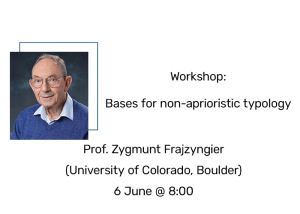Title: Bases for non-aprioristic typology
Speaker: Zygmunt Frajzyngier, University of Colorado, Boulder
When and where: 6 June 2025 @ 8:00, Room 211, Collegium Heliodori Święcicki
Abstract
The aim of the present talk is to demonstrate the advantages of non-aprioristic typology in two areas that presumably can be expressed in all languages, namely reference systems and locative expressions, and to discuss the aims of typology and the potential of typology as a research tool. A non-aprioristic typology is a typology that does not require a tertium comparationis and associated system of definitions (Frajzyngier 2021). The objects of non-aprioristic typology are functional domains and the functions encoded in the grammatical systems. Systems of reference are systems that allow the speakers to identify the referents of nouns mentioned in the utterances (Frajzyngier 2023). Locative expressions are expressions that denote where an entity or activity is located or that denote directionality, manner of motion, and places to which, or from which, an entity moves. In this talk I demonstrate that although all languages allow for the identification of referents of nouns, the functions through which nouns are identified differ significantly across languages even if the languages have similar coding means. For example, some languages code previous mention and other languages tell the listener to identify the referent by any means, often labeled ‘definite’. With respect to locative expressions, I demonstrate that although all languages can express where an entity is located and where and how the entity moves, languages differ in that some encode a locative domain in their grammatical system and other languages do not. Encoding the locative domain in the grammatical system has interesting lexical consequences in that some verbs and some nouns are inherently locative and others are not. This lexical distinction is not attested in languages that do not code the locative domain in their grammatical system.
References
- Frajzyngier, Zygmunt. 2013. Non-aprioristic typology as a discovery tool. In Functional-historical approaches to explanation: In honor of Scott DeLancey. Ed. by Tim Thornes, Erik Andvik, Gwen Hyslop and Joana Jansen. Amsterdam and Philadelphia: John Benjamins, 3-25.
- Frajzyngier, Zygmunt. 2019. An integrated approach to lexicon, syntax, and functions. Te reo- The Journal of the Linguistic Society of New Zealand 62.2.1-23.
- Frajzyngier, Zygmunt. 2021. Typology of functional domains. In Linguistic categories, language description and linguistic typology. Ed. by Luca Alfieri, Giorgio Francesco Arcodia, and Paolo Ramat. [Typological Studies in Language [external link] 132] Amsterdam and Philadelphia: John Benjamins, 101-135.
- Frajzyngier, Zygmunt. 2023. A typology of reference systems. Oxford: Oxford University Press.
- Frajzyngier, Zygmunt.2024. Locative predications in Chadic languages: Implications for semantic analysis. Oxford: Oxford University Press.
About the speaker
Zygmunt Frajzyngier, Professor Emeritus of Linguistics (MA University of Warsaw, MA University of Ghana, PhD University of Warsaw) started his professional career at the University of Warsaw in 1965 and since 1970 continued his work at the University of Colorado in Boulder. He held research appointments at the CNRS in Nice, the Max Planck Institute for Evolutionary Anthropology in Leipzig, the Center for Linguistic Typology at La Trobe University, visiting professorships at the University of Nice, the LABEX program in Paris, Pays de la Loire Chaire Régional de chercheur étranger, the City University of Hong Kong and the Far Eastern Federal University in Ussurijsk. He is a recipient of the Humboldt Research Award and the Senior Fulbright Specialist appointment at Universita degli Studi di Napoli L’Orientale. His main interests include the foundations of syntax and semantics in cross-linguistic perspective; typological explanations in grammar; grammaticalization; Chadic and Afroasiatic linguistics, the discovery of grammatical structures, i.e. descriptive grammars and dictionaries. He is the author, co-author and editor of 31 books, and over 140 papers. His recent books include Language formation by adults (2021, Brill) with Natalia Gurian and Sergei Karpenko, Typology of reference systems (2023, OUP), The emergence of functions with Marielle Butters (2019, OUP), Afroasiatic languages with Erin Shay (2012, CUP), and Locative predications in Chadic (2024, OUP). Books under contract include Unsettled questions in Mandarin: Selected domains and functions with Meichun Liu (Brill), and most recent Semantic structures of grammatical systems and their realizations (Brill).
